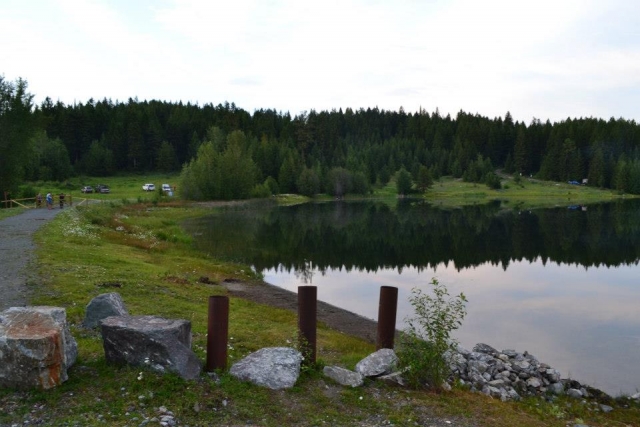Greenwood residents hear at meeting Marshall Lake still scheduled for decommissioning
The future of Marshall Lake was the topic of the hour when a group of concerned Boundary residents met with ministry staff in Greenwood, June 26.
The Ministry of Forests, Lands and Natural Resource Operations made a presentation at MacArthur Centre to a group of about 25 locals and stakeholders.
After doing studies on the dam, the Ministry has decided decomissioning is still the best option because the dam does not meet current safety regulations.
“We can only go with what they give back to us. (We) either have to fix the dam, or take it down,” stated Brian Jantz, a fisheries biologist.
Currently, there are two plans in discussion and neither of them include bringing the lake level back up to its previous depth.
The first option is to create a 46-metre long breach along the dam, which would drop the water level another metre and take pressure off the dam. The other option is a complete breach of the dam. While both of those options will cost money, neither would be as expensive as repairing the dam.
“If it was cheaper to repair the dam, just think about the logic,” said media spokesperson Brennan Clarke, in a follow-up interview. “Why wouldn’t we do that?”
But, locals who don’t want to lose a a treasured recreational spot, feel the dam and lake are worth more than just money.
“The money to maintain the dam to standards — in my opinion — some things are worth more than money and saving Marshall Lake is one of them. They also stated that political pressure could work so anyone who cares should be contacting their political representatives asking them to stop the Ministry from destroying the dam,” said John Greaves, a local activist who has been part of the three-year long campaign since the start.
The dam has been in the spotlight since 2010, after the Testalinden Lake dam failure outside Oliver that led to a province-wide review of dams. When Testalinden Lake dam failed, it created a mudslide that destroyed five homes.
“Providence Lake dam (Marshall Lake) was flagged in the review as a high risk, high consequence dam,” said Tara White, the ministry’s Senior Fisheries Biologist, adding it still doesn’t meet the current dam safety regulations. “We evaluated all the information, and had to make some hard choices … explore other options … that’s the reality of the situation.”
In 2010, the Canadian Dam Association (CDA) issued that the lake be drained half a metre, and discussion about the future of Marshall Lake, continued. In 2012, the water level was dropped and the City of Greenwood had the opportunity to take the license for the dam. They would have had control over the dam’s future and been responsible bringing it up to standards or having it decomissioned. The City declined, saying it wasn’t in a position to take on the project.
“We’re in a position where we’ve been told it’s a high risk dam.” stated Dan Peterson, the director of research management with the ministry
Resident’s aren’t the only one voicing their concerns. Local stakeholders also attended the meeting to find out the future of this popular wilderness recreational location.
“One of the things I really want to make sure … I just don’t want you guys to walk away from this,” said Greenwood mayor Nipper Kettle. “In the end, we need something out there, a place to use on a regular basis. I want a commitment that you’re not going to walk away from this, so the citizens of our community will have a recreational area to use.”
For the last three years, a group of concerned citizens have worked to stop the decommissioning of the dam, and find different options regarding the lake. The Marshall Lake Stewardship Group, which as a following of almost 700 members on Facebook, has undertaken a number of initiatives, including the collection of over 1200 signatures on a paper petition, the collection of thousands of signatures on an online petition, letters of support from Boundary local governments, and a number of events at the lake.
The dam is slated for decomissioning in late summer, early September. According to Clarke, this is the “fisheries window” that will do the least damage to the ecology is the surrounding creeks and rivers.






















